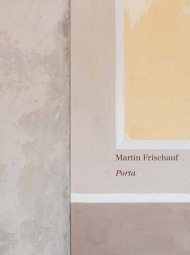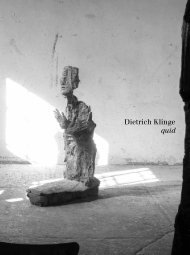Sie wollen auch ein ePaper? Erhöhen Sie die Reichweite Ihrer Titel.
YUMPU macht aus Druck-PDFs automatisch weboptimierte ePaper, die Google liebt.
<strong>Dietrich</strong> <strong>Klinge</strong><br />
condicio <strong>–</strong><br />
<strong>Zustände</strong>, <strong>Verhältnisse</strong>, <strong>Bezüge</strong><br />
1
2
<strong>Dietrich</strong> <strong>Klinge</strong><br />
condicio <strong>–</strong><br />
<strong>Zustände</strong>, <strong>Verhältnisse</strong>, <strong>Bezüge</strong>
<strong>Dietrich</strong> <strong>Klinge</strong><br />
condicio <strong>–</strong><br />
<strong>Zustände</strong>, <strong>Verhältnisse</strong>, <strong>Bezüge</strong>
10
11
14
15
… Träte nun zu solchen Menschen, wenn sie so beisammen sind, Vulkan mit seinen<br />
Werkzeugen und fragte: „Was wollt ihr doch, ihr Menschen, einer vom andern?“<br />
und keiner wüßte es zu sagen, und er spräche nun: „Wollt ihr vielleicht so ganz<br />
vereiniget seyn, daß Tag und Nacht keiner vom andern sich trenne? Wünschet ihr<br />
dies, so will ich euch so zusammenfügen und zusammenschmelzen, daß ihr aus<br />
zweien Eins werdet, daß ihr, so lange euer Leben dauert, als ein Wesen zusammen<br />
lebet, und bey eurem Tode gemeinschaftlich in die Unterwelt wanderet, und auch<br />
dort nicht zwey seid, sondern Eins! Besinnet euch, ob dieß euer Wunsch sey, ob es<br />
euch recht wäre, wenn ihn jemand erfüllen wollte?“ -: keiner, das weiß ich, würde<br />
dann Nein sagen, keiner einen andern Wunsch äussern jeder nur seinen eignen<br />
längst gefühlten Wunsch zu hören glauben: zusammengeschmolzen und verbunden<br />
mit seinem Geliebten aus zweyen Eins zu werden. Die Ursache davon ist, weil wir<br />
jetzt nur Brüche von Menschen sind, ehmals aber ganze Menschen waren. Liebe ist<br />
also nichts anders, als das Verlangen und das Streben nach der Ergänzung unseres<br />
Wesens. Denn, wie gesagt, wir waren ehmals ganze Einheiten, aber jene unseelige<br />
Revolution unsrer Ahnen hat den Zeus zu der unglücklichen Theilung veranlaßt,<br />
und seitdem sind unsre Hälften dislocirt worden, wie die Arkadier durch die Spartaner.<br />
…<br />
Das Gastmahl von Plato oder Gespräch über die Liebe<br />
Herausgegeben von Friedrich Schiller<br />
Übersetzt von Friedrich Immanuel Niethammer<br />
Neue Thalia, Leipzig 1792/93, Zweiter Band, 1. Auflage, S. 215/216
Figur 317 <strong>–</strong> 318<br />
Bronze, 2015<br />
26 x 34,6 x 34,6 cm<br />
9 Exemplare
Figur 293 <strong>–</strong> 294<br />
Bronze, 2015<br />
27,8 x 11,5 x 7,4 cm<br />
9 Exemplare
23
Figur 284<br />
Bronze, 2015<br />
27,89 x 21,6 x 18,7 cm<br />
9 Exemplare
Figur 291 <strong>–</strong> 292<br />
Bronze, 2015<br />
12,4 x 50,7 x 16,5 cm<br />
9 Exemplare
28
Figur 289 <strong>–</strong> 290<br />
Bronze, 2015<br />
18,8 x 30 x 20 cm<br />
9 Exemplare<br />
29
Figur 273/281<br />
Bronze, 2015<br />
32,7 x 32 x 20,7 cm<br />
9 Exemplare
Figur 301 <strong>–</strong> 302<br />
Bronze, 2015<br />
19,6 x 32 x 21 cm<br />
9 Exemplare
34<br />
Figur 285 <strong>–</strong> 286<br />
Bronze, 2015<br />
19 x 34 x 19,7 cm<br />
9 Exemplare
35
36
37<br />
Figur 299 <strong>–</strong> 300<br />
Bronze, 2015<br />
26,2 x 29,8 x 22,1 cm<br />
9 Exemplare
38
Figur 287 <strong>–</strong> 288<br />
Bronze, 2015<br />
14,2 x 34,5 x 20 cm<br />
9 Exemplare<br />
39
40
Figur 297 <strong>–</strong> 298<br />
Bronze, 2015<br />
18 x 21,7 x 30 cm<br />
9 Exemplare<br />
41
42<br />
Figur 282 <strong>–</strong>283<br />
Bronze, 2015<br />
24,7 x 37 x 21 cm<br />
9 Exemplare
43
44<br />
Figur 295 <strong>–</strong> 296<br />
Bronze, 2015<br />
18 x 23,4 x 19,4 cm<br />
9 Exemplare
46
Figur 305 <strong>–</strong> 306<br />
Bronze, 2015<br />
26 x 26 x 19 cm<br />
9 Exemplare<br />
47
48<br />
Figur 303 <strong>–</strong> 304<br />
Bronze, 2015<br />
16,5 x 16,5 x 15,7 cm<br />
9 Exemplare
Translation:<br />
„ … Suppose Hephaestus, with his instruments, to come to the pair who are lying side by<br />
side and to say to them, 'What do you people want of one another?' they would be unable<br />
to explain. And suppose further, that when he saw their perplexity he said: 'Do you desire<br />
to be wholly one; always day and night to be in one another's company? For if this is what<br />
you desire, I am ready to melt you into one and I let you grow together, so that being two<br />
you shall become one, and while you live a common life as if you were a single man, and<br />
after your death in the world below still be one departed soul instead of two <strong>–</strong> I ask whether<br />
this is what you lovingly desire, and whether you are satisfied to attain this?'- there is not a<br />
man of them who when he heard the proposal would deny or would not acknowledge that<br />
this meeting and melting into one another, this becoming one instead of two, was the very<br />
expression of his ancient need. And the reason is that human nature was originally one and<br />
we were a whole, and the desire and pursuit of the whole is called love. There was a time, I<br />
say, when we were one, but now because of the wickedness of mankind God has dispersed<br />
us, as the Arcadians were dispersed into villages by the Lacedaemonians. … “<br />
Plato, Symposium<br />
Translated by Benjamin Jowett<br />
© freshup! Publishing, Stuttgart 2015<br />
Typographie, Gestaltung, Reproduktion<br />
<strong>Dietrich</strong> <strong>Klinge</strong>, Rica Bock, Schwabenrepro GmbH<br />
Druck<br />
Wenng Druck, DInkelsbühl<br />
ISBN 978-3-944526-52-2
51
52

















